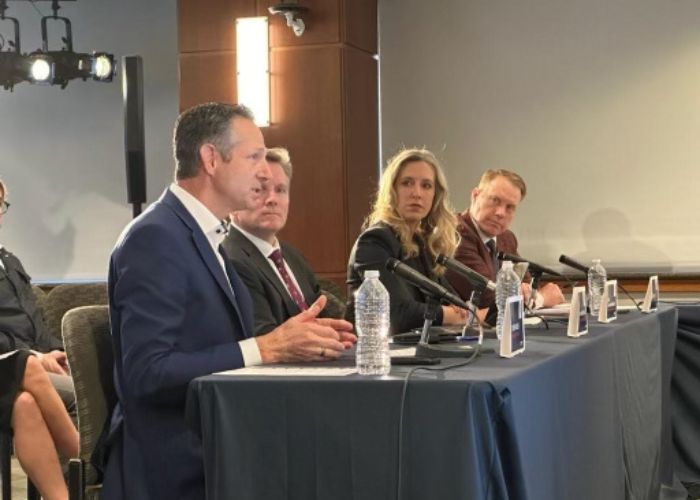On Thursday, May 30, 2024, Balancing Act Project (BAP) – a new bi-partisan, non-profit coalition of multi-sector industry employers, non-profits, policy experts and trade groups – hosted Utah Governor Spencer Cox, Utah members of U.S. Congress and trade organizations for a discussion on the impacts of the current government imbalance between Congress and federal agencies in creating and enforcing regulations.
The discussion explored how increases in regulations are linked to Americans paying more for groceries, clothing, gas, and electricity; the government imbalance on behalf of affected industries and consumers, championing legislation to reassert Congress’ outlined role in regulatory frameworks; and re-empower the voice of the people through their elected officials.
ROUNDTABLE PARTICIPANTS:
- Utah Governor Spencer Cox
- Rep. Blake Moore, Utah First Congressional District
- Rep. John Curtis, Utah Third Congressional District
- Rep. Burgess Owens, Utah Fourth Congressional District
- Rep. Celeste Maloy, Utah Second Congressional District
- Robert Spendlove, Zions Bank Senior Economist (Moderator)
- Brian Sommers, Utah Mining Association
- Rikki Hrenko-Browning, Utah Petroleum Association
- Dave Davis, Utah Food Industry Association
- Todd Bingham, Utah Manufacturing Association
- Scott Simpson, Utah Credit Unions
- Howard Headlee, Utah Bankers Association
- Derek Miller, Salt Lake Chamber
- Curtis Blair, Utah Valley Chamber of Commerce
Watch the discussion here.
ADDITIONAL BACKGROUND:
As a leading state in regulatory reform, Utah serves as an example of rejecting agency deference to ensure a fair and balanced judicial system. In federal and state courts across the country, Americans often face challenges when disputing executive agency decisions due to doctrines that require judges to defer to agency interpretations of the law. While the Supreme Court has been slow to end Chevron and Auer deference in the federal courts, state courts and legislators are taking action. Utah ended deference to state agencies and more will follow their lead.
BAP will serve as a convener for a national conversation regarding accountability of power and work to define what is expected to be a new regulatory environment in the wake of a pending decision by the U.S. Supreme Court (SCOTUS) regarding the current legal deference afforded to federal and state agencies in their determination of legislative intent.
SCOTUS CASE BACKGROUND:
In 2024, the U.S. Supreme Court will reconsider the Loper Bright Enterprises v. Raimondo case, a case likely to overturn a longstanding precedent known as “Chevron deference.” This precedent, established in a 1984 SCOTUS decision, grants regulatory agencies significant leeway in interpreting vague laws passed by Congress. Over time, this deference has shifted power from Congress to federal agencies, leading to the practice of passing ambiguous laws with the expectation that agencies will clarify them. The potential reversal of Chevron deference could empower businesses affected by regulations to challenge decisions made by agencies, ultimately giving citizens and businesses a stronger voice through their elected representatives.


